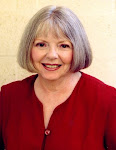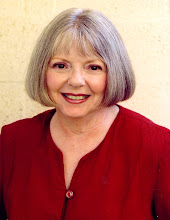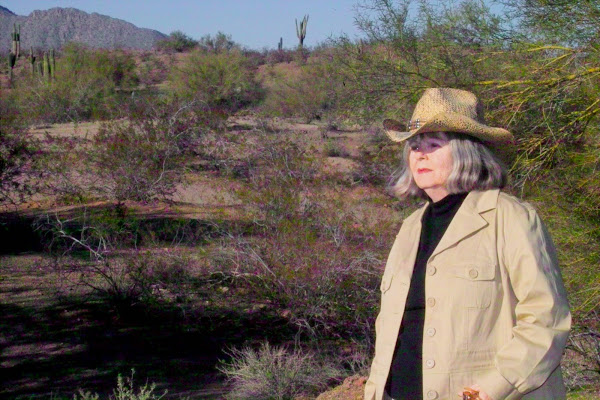BETTY: You seem never to have met a pun you didn't like. Tell me about that, and when it started. I believe your first few books in the Meg series didn't use them.DONNA ANDREWS: Murder with Peacocks was named rather by accident--I couldn't think of a title for it that I liked, so I called a friend and told her I needed a title for the book. "Which book?" she asked, knowing I had several projects in the works. "Do you mean the murder mystery with the peacocks?" I immediately decided that Murder with Peacocks would make a great title--I thought it would signal to the reader that this probably wasn't a gritty, noir novel, and maybe even hint that it was supposed to be a funny book.
Originally, I was calling the second book The Puffin Caper. Ruth Cavin, my editor, hated that. She suggested Puffins on Ice --which to me sounded like an Icecapades routine--picture Brian Boitano or Scott Hamilton in a tuxedo with a puffin mask. So she asked me to submit some other titles. I brainstormed furiously. I drafted my friends into brainstorming. We came up with a remarkable number of puffin-themed titles, mainly by taking existing titles and, well, puffinizing them. A sampling:
Lord of the Puffins. The Sound and the Puffin. As I Lay Puffin. Zen and the Art of Puffin Maintenance. The Puffins of Killamanjaro. Gone with the Puffin. Puffinheit 451. Tell Me How Long the Puffin's Been Gone. To Kill a Puffin-bird. A Puffin for Leibowitz. A Puffin for Adano. Cry the Beloved Puffin. David Puffinfield. Bleak Puffin. A Tale of Two Puffins. Far From the Madding Puffin. The Puffin of Casterbridge. Wuthering Puffins. Puffin and Prejudice. Return of the Puffin. Tarzan of the Puffins...
You get the idea. I chose a dozen of the best, sent them in, and after some weeks was told that Marketing had decided to call the book Murder with Puffins, for series continuity.
I was a little worried then that I'd be stuck with a formula--Murder with Large Ungainly Bird of the Year, to paraphrase something Dan Stashower said. So when thinking of a title for the third book, I picked Revenge of the Wrought Iron Flamingos, thinking that if they changed it, at least they would have to change it to Murder with Wrought Iron Flamingos, since there are no real, live flamingos in the book. Luckily they liked my original title, and I was able to talk them into Crouching Buzzard, Leaping Loon, the following year. The puns began with We'll Always Have Parrots, and continued with Owls Well That Ends Well and No Nest for the Wicket. The Penguin Who Knew Too Much, which came out in August 2007, breaks the run of puns, but I'm going back to a pun with the next, which last I heard was still titled Cockatiels at Seven.
Sometimes the bird comes first and I have to work on a pun, and sometimes I think of a pun and then figure out a way to involve that bird in the book. And I'm always looking for good avian puns--I'm thinking of having a contest for possible titles next year.
BETTY: How many books in all have there been in the Meg series?
DONNA: So far there have been eight books, with number nine, Cockatiels at Seven, in the works for an August 2008 release. And Ruth Cavin, my editor at St. Martins Minotaur, has approved my idea for the tenth book, which I'm now researching so I can start writing soon. That's one of the great things about having done so many books--by now, Ruth has figured out that I can probably be trusted to complete a book within shouting distance of the deadline--and that it will bear at least a slight resemblance to the initial idea she approves. There have also been two Meg short stories, one in Chesapeake Crimes 1 and the other in Death Dines In. I keep a list of the books and short stories in the series here:
http://donnaandrews.com/faqs.html
BETTY: An ornamental blacksmith is a pretty unusual protagonist. How'd you come up with her?
DONNA: Two things influenced my choice of a profession for Meg. One was that at the time I began writing Murder with Peacocks, I was working at a nine to five desk job. It didn't leave a vast amount of time free for writing, and I could see that if I were a mystery protagonist, I wouldn't have a lot of time free for sleuthing. So I wanted to give Meg a profession that would allow her a lot more control over her
schedule--a profession, for example, that would let her take the summer off, in Peacocks, to plan three family weddings. And about the time I was trying to decide on a profession for her, I was probably going to a craft fair--because I go to a lot of them. I am a craft fair junkie. Anyone who walks into my house can tell. I should probably be looking for a twelve-step program. Anyway, I liked the idea of making Meg a craftsperson, and then it hit me that if she was a blacksmith, no one would quibble with the notion that she was strong enough and resourceful enough to take care of herself when, as happens more than once in the series, she goes head to head with the villain. I always hate it when an otherwise strong, competent and independent heroine has to be rescued in the climax of the book by the hero. I wanted Meg to be able to do her share of the rescuing. Including having a sword fight with the villain in one book.
BETTY: Discuss the animal tie-ins to each book (especially, God help us, the penguins).
DONNA: Well, we talked about the birds in the title, so I guess you mean all the other animals that seem to be weaseling their way into the plots. W.C. Fields is supposed to have said "Never work with children or animals." But he was an actor, and well aware of the danger of being upstaged. I don't have to worry about that--I'm more like the director who inflicted the children and animals on Fields. It's not a problem if children and animals try to upstage Meg--she can handle them. So while I suspect she'd sometimes rather have fewer animals around, she's not likely to get her wish.
Spike, for example, the small canine furball who first appeared in Murder with Peacocks, is here to stay. Technically, he belongs to Michael's mother, but Mrs. Waterston dumped him on Meg and Michael, on
the suggestion of her allergist, several books ago, and it's beginning to look as if they are going to be stuck with "The Small Evil One" indefinitely. I usually try to give Spike a small but vital role in the
books, but never doing anything that a small, bad-tempered little dog wouldn’t normally do, like bite someone or bark at something big enough to gulp him down like an hors d'oeuvre. She'd never admit it, but even Meg's getting rather fond of him by now. Or at least resigned to having him around.
It also looks as if the penguins from The Penguin Who Knew Too Much won't completely disappear from her life, now that I've given Caerphilly its own zoo and handed it over to Dr. Montgomery Blake, celebrity
naturalist and animal welfare activist. I'd been wanting to use penguins for a while, but I didn't want to have to take Meg to Antarctica or some other suitable penguin habitat. For one thing, I'm a southerner, and doing the necessary research would be a real pain, and for another, I know that much of the humor in the Meg books arises from what her family and friends are doing--and I couldn't plausible transport the whole crew to a cold climate.
But while I was in Omaha for Mayhem in the Midlands, I went to the Henry Doorly Zoo and saw the little blue penguins, and realized that I didn't need to take Meg to the penguins--I could bring the penguins to her, courtesy of a bankrupt local zoo that needed a temporary home for its penguins. And as long as I had a zoo full of animals needing new homes, why not have a few more of them wash up on Meg's doorstep, and voila! A plot was born.
BETTY: You also have another series, which you term a "technocozy." Exactly what is a technocozy?
DONNA: It's a term my editor at Berkley, Natalee Rosenstein, coined to describe the unique nature of the Turing Hopper series. It's a traditional mystery, but set in the world of people and companies that use technology--a modern urban setting--rather than in St. Mary's Mead or Cabot Cove. But the characters are traditional--cozy--characters rather than tough, hardboiled ones.
Although it's not what I consciously set out to do, I realized as I was writing the Turing books that one thing I liked about them was that they pitted a group of allies who were basically nice, normal people--well, okay Turing isn't a normal kind of person, but she is a fairly nice one--against the rather dark and noir world of cybercrime. Cybercrime is profoundly the opposite of nice--pornography, gambling, identity theft, spam, phishing--almost makes you homesick for a simple murder. So for me, writing them is not only about seeing good triumph over evil--it's also about seeing nice and normal triumphing over big, scary, impersonal and nasty.
BETTY: I'm almost afraid to ask how you came up with Turing Hopper, but the devil's making me do it. How in the world....?
DONNA: I have no idea. I sometimes say that it would require years of psychoanalysis to figure it out. I think it arose partly from my desire to use computers in fiction in some accurate and yet innovative way--much of what you see about computers or any kind of technology in books is either Luddite paranoia or Tom Clancy style technoporn. I wanted to do something different, more realistic, and more interesting. But the core idea of the Turing series--that the protagonist would be an artificial intelligence who has become sentient and begins sleuthing when the programmer who created her disappears--no idea where I came up with that.
BETTY: You must be a bit of a computer whiz, yourself. Explain, and talk a little about the Turing Hopper books.
DONNA: I'm not so much a computer whiz as a computer aficionado. Computers fascinate me--the wonders they can perform and the simple things that are beyond them. The way they have insinuated themselves into so many aspects of our lives, for good and ill. The way people--myself included--have such strong feelings about what are basically inanimate objects.
And the last five years I worked at my day job, one of my main functions was as a translator between the marketing and computer divisions of the company. I tried never to get so immersed in the nitty gritty of
technology that I couldn't pull back and explain what they needed to know about it to people who were less fascinated than I was. I think that's a skill that I put to good use in the Turing books. I try to write them so my tech-savvy friends find them accurate while at the same time readers who don't like or understand computers will still be able to read them without any problem.
One thing I try to do in the Turing books is feature a crime that has tendrils in both the real world and the cyberworld. If it was only in cyberspace, Turing wouldn't need her human friends to solve it, and if
it was only in real life, Turing would be left out. But when you have something like credit card fraud or identity theft or skullduggery around role-playing games--something that crosses into both worlds--it
makes for a much more interesting mix of Turing's skills and those of her human friends Maude and Tim.
Tim's a particularly important part of the equation--he's a complete technophobe who can barely operate his cell phone, so whenever anything comes up in the course of a Turing book that readers might find confusing--never fear: before too long, Tim will get up his nerve to admit that he has no idea what Turing and Maude are talking about--and the reader can learn along with him.
BETTY: I note that you were born and raised near in Jamestown. We have a connection, then. One of my ancestors was in Jamestown in the 1600s (Anthony Minter). How does coming from such an incredibly historic area impact your writing, and in which book did you make use of it? Have you ever thought about writing a historical about the area?
DONNA: I’m from Yorktown, and yes, growing up in such a richly historic area has had an effect. I have had thoughts or writing something set in colonial times, but long exposure to Yorktown, Jamestown, and Williamsburg has made me very aware of how much work it is to make things really, truly historically accurate, so I haven't tried it yet. But I did use historical re-enactors in Revenge of the Wrought Iron Flamingos. And that experience probably made me more interested in writing something set in the colonial or revolutionary period--I realized how many more people are interested in reenacting the Civil War than the Revolution. The Revolution don't get no respect! We need to fix that!
Another thing I discovered while writing Flamingos was that growing up in Yorktown made me very aware of aspects of history that most people don't know about. Even the vocabulary I used, for example--I had no idea whether normal people knew what a pannier was, or redoubts, or who Baron Von Steuben was. I had to rely on my critique group to tell me what was common knowledge and what I needed to explain so my readers wouldn't be totally lost.
BETTY: What's your next project?
DONNA: My next writing project is the tenth Meg book--which I won't say a whole lot about because it's still in the planning stages. Though the next thing the public will see is Cockatiels at Seven, the ninth book, in which one of Meg's friends dumps her two-year-old son on Meg--"just for a little while." When her missing friend doesn't return to claim little Timmy after twenty-four hours--and hasn't answered her home phone or cell phone--Meg goes looking for her. She's not sure whether her friend has been killed, or kidnapped; whether she's on the run from the bad guys or maybe even from the police--but she's determined to find out. Even if she has to do her sleuthing with the two-year-old in tow.
I also have a couple of short stories coming out soon. One will be in an anthology, Unnatural Suspects, edited by Dana Stabenow--each story has to feature a murder in a fantasy or science fiction setting. The other will be in Moonlight and Mistletoe, edited by Charlaine Harris and Toni L.P. Kelner, a sequel to their New York Times bestselling anthology Many Bloody Returns. I also had a short story in the September/October 2007 issue of Ellery Queen's Mystery Magazine and an essay in House Unauthorized, a collection of essays about the TV show House. At the moment, the Turing series is on hiatus, but the up side of that is that I have more time to do short stories, which is a lot of fun.
And I'm scheduled to be one of two guests of honor--William G. Tapply is the other--at Murder in the Magic City, which will be held in Birmingham, Alabama on February ? 2008. And of course I'm planning to
hit other conventions during the year--Left Coast Crime in Denver, Malice Domestic, Mayhem in the Midlands, and Bouchercon in Baltimore. So it's shaping up to be a busy year.
BETTY: What kind of advice do you have for beginning writers?
DONNA: Read several million words in whatever genre you're trying to write. Be prepared to write a million words or so before you get published, because that's sometimes what it takes. Find the right critique group-- even if it's only you and one other person--a group where you care about what the other writers are writing, find value in what they have to say about your writing, and go home fired up to work. And start doing your homework about the publishing industry before you finish your book, so you know how to tell an honest agent or editor from a crook who's trying to take advantage of your passion to be published.
To learn more about Donna Andrews, log onto...
website: http://donnaandrews.com/
blog: http://donnaandrews.typepad.com/donna_andrews/
mailing list: http://donnaandrews.com/mailinglist.shtml
Thursday, January 3, 2008
Subscribe to:
Post Comments (Atom)










3 comments:
Donna is always original and funny--a dynamite combination. I love the idea of her Turing Hopper books, he "cozy" with a computer as a main character--how cool is that!
Donna is always original and funny--a dynamite combination. I love the idea of her Turing Hopper books, he "cozy" with a computer as a main character--how cool is that!
Do you know if Donna Andrews does anything specifically to give advice for Meg Langslow style time management? Blogs, mystery book, interviews? Anything else?
Post a Comment